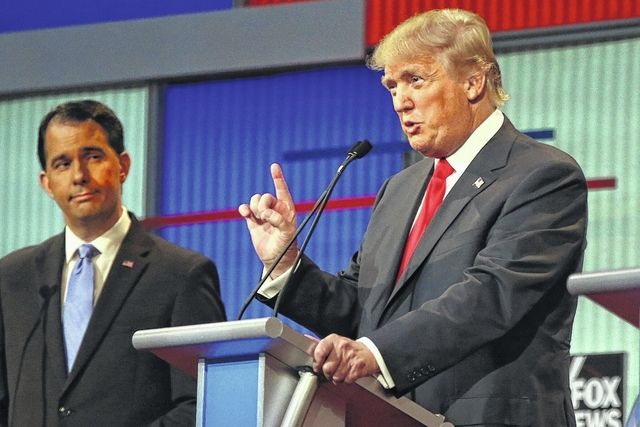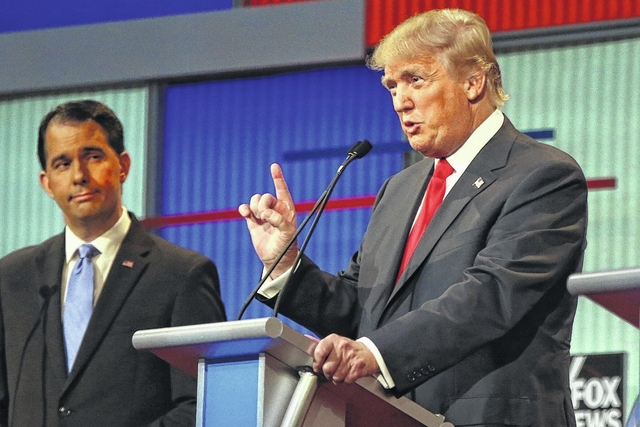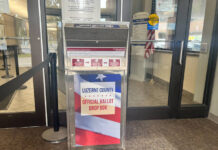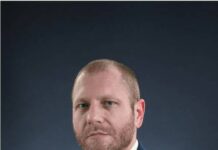CLEVELAND — Setting a combative tone, billionaire businessman Donald Trump grabbed the spotlight in the first Republican presidential debate, declaring he would not commit to supporting the party’s eventual nominee and would not rule out running as a third-party candidate.
“I will not make the pledge at this time,” Trump said. He also refused to apologize for making insulting comments about women, saying, “The big problem this country has is being politically correct.”
Kentucky Sen. Rand Paul immediately jumped in to challenge Trump on his refusal to commit to supporting the party nominee.
“He’s already hedging his bets because he’s used to buying politicians,” Paul said, as a raucous crowd of 4,500 egged the candidates on.
Trump’s blunt style was in line with the approach he’s taken to his campaign throughout the summer, appealing to voters frustrated with career politicians and perplexing his rivals. He entered the first debate leading the polls in a field filled with governors and senators.
With Trump standing at center stage Thursday night, most of the contenders alongside him fought for attention without engaging him directly. Seventeen Republicans are seeking the party’s nomination, but only 10 were invited by debate host Fox News to participate in the main event based on their showing in recent polls.
Immigration and counterterrorism dominated the early stages of the debate, two issues that highlight the deep divisions within the Republican Party.
Former Florida Gov. Jeb Bush, a favorite of the party’s establishment wing, defended his call for a path to legal status for some of the people living in the U.S. illegally. It’s an unpopular position among some Republican voters who equate legal status with amnesty.
“The great majority of people coming here have no other option,” Bush said.
Trump in particular has pushed the issue of immigration throughout the summer, drawing criticism for saying Mexican immigrants are rapists. He said Thursday that he had been told that by border patrol agents, and he took credit for immigration being an issue in the2016 campaign.
“If it weren’t for me, you wouldn’t even be talking about illegal immigration,” he said.
Paul and New Jersey Gov. Chris Christie engaged in a heated exchange over the USA Patriot Act and laws giving government access to Americans’ phone records.
Christie, a former U.S. attorney, said he was the only person on the stage who had filed applications under the Patriot Act and gone before secretive courts for authority.
“I will make no apologies ever for protecting the lives and the safety of the American people,” he said, arguing the government needs more tools, not fewer.
Paul, a staunch opponent of the surveillance programs, said he wanted to collect more records from terrorists, not law-abiding Americans. He said Christie’s embrace of the counterterrorism policies amounted to “hugging” President Barack Obama, a reference to the governor’s embrace of the president in the aftermath of Superstorm Sandy in the days before the 2012 election.
Also on stage Thursday was Wisconsin Gov. Scott Walker, whose victories over unions in his home state created his national profile. Florida Sen. Marco Rubio, the youngest candidate in the field at age 44, is trying to carve out a niche as a foreign policy authority, but has struggled to break through this summer — particularly since Trump’s surge.
Sen. Ted Cruz, surgeon and tea party favorite Ben Carson, former Arkansas Gov. Mike Huckabee, and Ohio Gov. John Kasich rounded out the debate lineup.
The crowded field meant limited talking time for candidates, many of whom were introducing themselves to Americans for the first time.
“I wasn’t sure I was going to get to talk again,” Carson quipped when the moderators came back to him.
The remaining seven candidates were relegated to a pre-debate forum, a low-key event in a largely empty arena, where candidates avoided debating each other and largely stuck to scripted responses on domestic and foreign policy.
Former Texas Gov. Rick Perry and businesswoman Carly Fiorina opened the early event with biting criticisms of Trump.
Perry — whose failed 2012 White House campaign was damaged by an embarrassing debate stumble — accused Trump of using “his celebrity rather than his conservatism” to fuel his run for president.
Fiorina, the only woman in the GOP field, said that Trump had tapped into Americans’ anger with Washington, but she challenged the businessman as lacking policy positions. “What are the principles by which he would govern?” she asked.
While the candidates pitch their visions for the Republican Party’s future, they’ll also be making the case that they would present the strongest general election challenge to Hillary Rodham Clinton, the front-runner for the Democratic nomination.
Clinton was scheduled to be traveling during the debate and didn’t plan to make a statement afterward. Her campaign preemptively made the case that there was little difference between Trump’s “outrageous” positions and the rest of the field.
“They all have an identical agenda,” said Joel Benenson, Clinton’s chief strategist.
Thursday’s debate is the first of six party-sanctioned forums scheduled before primary voting begins in February. Fox News used national polls to determine which 10 candidates would be on the stage, and several candidates were grouped together in the single digits — most separated by a number smaller than the polls’ margin of error.





